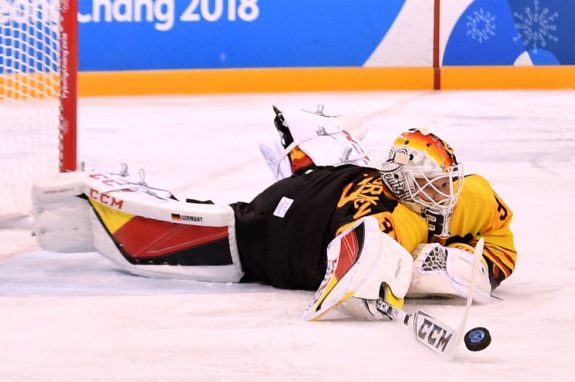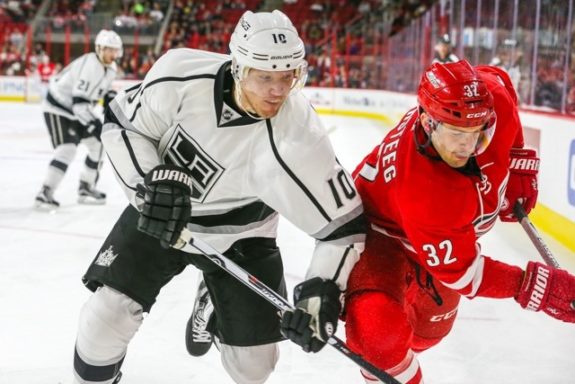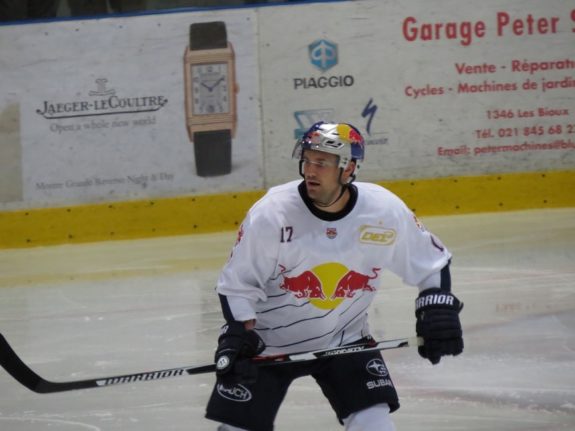The playoff portion of the men’s hockey competition is about to get underway in PyeongChang. Sweden, Canada, the Olympic Athletes of Russia, and the Czech Republic were the top finishers of the preliminary Groups, and have thus earned byes for the first playoff round of the tournament. For all teams right now it is single-elimination format, so that will mean do or die when it comes to advancing for a medal.
The teams not receiving a bye will square off for the opening round starting Feb. 20. While each of them had their faults throughout the prelims, perhaps no team had been in better standing but failed to capitalize than the Germans. This stems from the fact that of all the men’s teams competing in PyeongChang, Germany was the least impacted by not having NHL players on their roster. While other teams had to take three or four steps back from what they typically bring to an Olympic table, the Germans remained fairly stable.
Patrick Hager scores twice in Germany's #GER 2-1 shootout win over Norway #NOR in #PyeongChang2018 Men's #IceHockey! Find the story and more photos here: https://t.co/6aBjvv4AzX
Photo: Andre Ringuette / HHOF-IIHF Images pic.twitter.com/I4ZP9aebXG
— IIHF (@IIHFHockey) February 18, 2018
Some of you will probably argue, “What do you mean? They don’t have Draisaitl with them”. Technically you are right, but think about it for a moment. There are presently only seven current Germans playing in the NHL. Of those seven, Leon Draisaitl, Tom Kühnhackl, Tobias Rieder, and Philipp Grubauer never even played in a previous Olympics. The point becomes moot, because the Germans have never utilized these four anyway (in most instances because of their young ages), so it is not like they are having to go without. The remaining three Germans – Thomas Greiss, Dennis Seidenberg, and Korbinian Holzer – have had Olympic experience, but none performed all that well, especially Greiss. Seidenberg may be the only one who offers any credence to the Germans lacking their NHLers.
Otherwise though, Germany had the least to lose out of a more level playing field, and they did not make the most of it. Here are some areas they will need to look at in order to have any hope in the playoffs.
Better Goaltender From aus den Birken
Being in Group C alongside Sweden, Finland and Norway was certainly not going to be any sort of cakewalk for Germany. Sweden, the top finishing team in the division, is a heavy favorite for gold. Germany pulled out only one win in the prelims, and it came as a shootout win over Norway which garnered them just two points. But what did not help matters is that German goaltender Danny aus den Birken looked very shaky in net.
The 33-year-old has been around for years, but is appearing in his first Olympics. At 6-foot-1 and just shy of 200 pounds, aus den Birken has good size and has been consistently among the top goaltenders in the Deutsche Eishockey Liga (DEL) back in Germany. However, when the Germans played their first game of PyeongChang against Finland, their veteran netminder gave up five goals on only 20 shots. Whether they are playing Finland, Sweden, South Korea, or anybody else, aus den Birken has to be better than that.

It was enough of a concern that in the second game of the tournament Germany elected to go with Timo Pielmeier against the Swedes. Pielmeier did incredibly well and only gave up a single goal on 26 shots. Head coach Marco Sturm went back to aus den Birken in the third and final game of the prelims against Norway. aus de Birken reaffirmed himself somewhat in this performance, got the win, and turned aside 28 shots.
If Sturm plans to go with aus den Birken against Switzerland in the opening round, then his goaltender has to be better than either his previous win over Norway, and certainly better than the loss to Finland. It may be safer to just go with Pielmeier.
Where Is the German Toughness?
If there is any team in PyeongChang that should be putting forth physical play and intimidation it would be Germany. They can certainly keep the play between the lines, but their physicality is one of their strongest suits – if not their strongest – and they just do not seem to be using it to their advantage.
Take for instance David Wolf. The 6-foot-2, 218-pound winger is a ferocious beast on the ice and seems to embody his surname to the utmost. A one-time member of the Calgary Flames, Wolf once had 168 penalty minutes in a 59-game season for the AHL’s old Adirondack Flames. He also has had three DEL seasons of over 100 PIMs as well. Wolf has one assist in the three Olympic games so far this year.
Marco Sturm remains head coach of the German national team. He extended his contract until 2022. https://t.co/7PnbE5UE1Z
Photo: Minas Panagiotakis / HHOF-IIHF Images pic.twitter.com/qKjQoTpBym
— IIHF (@IIHFHockey) February 5, 2018
Or what about defenseman Björn Krupp? Here is a player capable of taking a page out of his father Uwe’s book, and really stepping it up as a physical defender. It is just not happening. The 6-foot-2 Krupp is a minus-one through the three games, and has been mostly a non-factor in the little he has played. Which brings up a secondary point. Krupp’s ice time has increased through each of the three games, and he has added a few shots on goal in turn because of it. But Germany needs him to be more punishing the more that he gets onto the ice.
Now, no one is asking this team to goon it up. That is not the case, but their physical play is one of the few check marks in Germany’s plus column as opposed to the minus column. They are not as skilled as a Sweden or a Finland, so they need to work with what other advantages they have. Facing Switzerland as their first opponent in the playoff round, Germany is fortunate that it is a team that they are capable of out-muscling on pucks and along the boards. They just need to step up and do it.
Ehrhoff Needs to Step up His Game
When it comes to pure skill alone, former NHL defenseman Christian Ehrhoff is undoubtedly Germany’s best player on this roster. He needs to start playing like he is. Now let us make some clarification here. Ehrhoff has actually looked pretty solid in his own end. He looked particularly calm during the win over Norway, especially in the third period and in overtime. Ehrhoff looked very much like a veteran staying cool, calm and collected.
But if Germany is to have any hope of advancing through the playoffs, then Ehrhoff needs to be playing better. He is presently tied at a team worst minus-two for plus/minus. Ehrhoff is also tied for the team lead in penalties with two minor infractions.

Most importantly though, he has got to start creating some offense from the blueline. In the loss to Finland he picked up an assist on a Brooks Macek tally, but otherwise Ehrhoff really has not contributed offensively. Granted, he is 35 years old and past his prime. Still, Ehrhoff can still control the puck very well and set up wise plays. This is also a defenseman who three times hit double digits for goals in an NHL season. Six times her scored 30 or more points in a year. Even at 35 he can still score, and at least feed pucks for his teammates to finish.
Beating Switzerland Is Plausible
It is hard to say that Germany would have much of a prayer should they advance into the next round of the playoffs and face Sweden. That being said, they were able to keep the Swedes to just one goal even if they could not get the puck past Jhonas Enroth. Should they advance, it would be worthwhile to put Pielmeier in net against the Swedes given his previous performance.
First things first though – they have to get by Switzerland. This is a winnable game for Germany. Switzerland’s only win in their Group A competition was an 8-0 victory over the host nation of South Korea. Otherwise, they fell rather handily to both Canada and the Czech Republic, despite excellent play in net from Jonas Hiller.

It helps matters that German forward Patrick Hager has played solidly (team leader with two goals in three games). The rest of the team needs to give him some assistance. With the way Hiller has played in net, Germany will have a hard enough time scoring against Switzerland. More skaters need to contribute on the score sheet.
The Germans need to follow through on our aforementioned recipe for success. That is their only hope. Especially Ehrhoff – he needs to prove to many naysayers that he still has at least a few more All-Star caliber games in him. Remember that back in 2010 he made the IIHF’s All-Star Team for that year’s World Championships.
The Germans have yet to show us that they put a complete effort in for a full 60 minutes in PyeongChang. They burning daylight here and running out of opportunities.